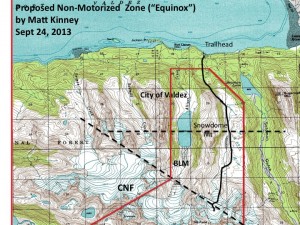Chugach Forest Plan Revision – Our Comments

Matt Kinney & Tabitha Gregory
Box 1540, Valdez, AK 99686
info@thompsonpass.com
July 31, 2013
U.S. Forest Service
Chugach National Forest
RE: COMMENTS REGARDING CHUGACH NATIONAL FOREST PLAN REVISION
We support the current process to revise the Chugach National Forest Plan (CNF). Our primary concern is CNF lands south of Valdez and Thompson Pass/Marshall Pass. Since the last revision, unanticipated changes have occurred across the CNF in this region that are having negative impacts. First, winter recreation, primarily snow machining and commercial helicopter skiing, have grown and displaced backcountry skiing on adjacent State lands. Second, climate change caused by human dependence on fossil fuels has become a global crisis. Two objectives—regulating mechanized winter recreation and stemming global warming—should be at the core of this CNF plan.
Regulation of Motorized Uses
The CNF south of Valdez and Thompson Pass warrants particular attention in regards to winter use. Conflicts between commercial and recreational users on State lands adjacent to CNF have increased over the past two decades. Many of the conflicts result from the State’s hands-off approach to land management. In addition to the inevitable user conflicts, the State’s approach has also created a poor business climate, displaced non-motorized user groups and lead to growing public safety concerns, including human-triggered avalanches.
As a backcountry ski guide and residents of Valdez since 1980, we’ve witnessed many changes in the progression of winter recreation around Valdez and the CNF. While backcountry skiing has a long history in the Chugach (dozens of established routes have existed across the region since the 1980’s) motorized sled and heli-skiing were relatively infantile before the existing plan was developed.
Backcountry skiing is increasingly popular in the United States as a healthy, fun, and low cost way to access remote areas with little or no impact on the environment. In this region, there is increased demand for the backcountry ski experience which, for many skiers, includes not only the physical effort of skiing, but also the ability to experience natural quiet and wilderness. Unfortunately, the backcountry ski experience that the lands surrounding Valdez and Thompson/Marshall Pass have long provided for us and other Alaskans has been severely diminished since heli-skiing, and more recently, powerful sleds arrived and overwhelmed the landscape. As a result, opportunities for this type of backcountry skiing experience have become very limited, particularly on State lands. Because the State provides for no non-motorized or quiet areas in the region, it is incumbent upon the U.S. Forest Service to acknowledge this in its own plan and allow for additional acreage to be set aside for such opportunities.
We recommend one such area be designated south of Marshall Pass and another area south of Port Valdez. These areas should be off limits to snowmachines and heli-skiing and provide a backcountry experience, including the experience of natural quiet.
Global Warming
Any increase in mechanized or carbon-dependent recreation in the CNF will increase current levels of C02. The current revision should seek to reduce C02 from existing recreational users, not encourage more. Any increased access such as opening current non-motorized areas to motorized vehicles, providing easier access for snowmachines, or allowing for more commercial heli-ski operating days would be a contradiction to Modified Alternative A.
Nowhere is it more appropriate to limit carbon pollution than on our public lands, including the CNF. New models of snowmachines use improved technology to reduce their contribution to carbon pollution. Old technology needs to be urgently phased out and the CNF plan should feature regulations that encourage this phase out.
While an outright ban of mechanized recreation is not practical, there are alternatives that will readily reduce the carbon footprint of motorized recreation on the CNF. Following are our recommendations.
1. Elimination of 2-stroke snowmachines and ATVs in the CNF by 2018.
2. Require all snowmachines using CNF lands to comply with noise and emissions standards and use Best Available Technology (BAT).
3. Eliminate or more tightly limit heli-ski user days in CNF. This industry provides the greatest contribution to greenhouse gases of any winter recreational user group in CNF. The adjacent loosely regulated State lands already provide for this type of experience. The State’s abundant lands and mountains are a practical and perhaps more affordable option. Any increase in helicopter skiing user days allowed to the current three permitees for the CNF would be in conflict with Modified Alternative A and its position on global warming.
We also support the development of remote public-use huts and cabins throughout the CNF in areas used for recreation including boating, hiking, and backcountry skiing, particularly in the areas south of Valdez. We believe the expansion of the existing cabin system to include winter-use huts will increase opportunities for local recreationists as well as support winter tourism.
In conclusion, we look forward to working with U.S. Forest Service staff to more specifically identify areas within the CNF that best suit the qualities needed for backcountry skiing from Valdez and Thompson Pass.
Thank you for your consideration of these recommendations and comments.
Sincerely,
Matt Kinney Tabitha Gregory
